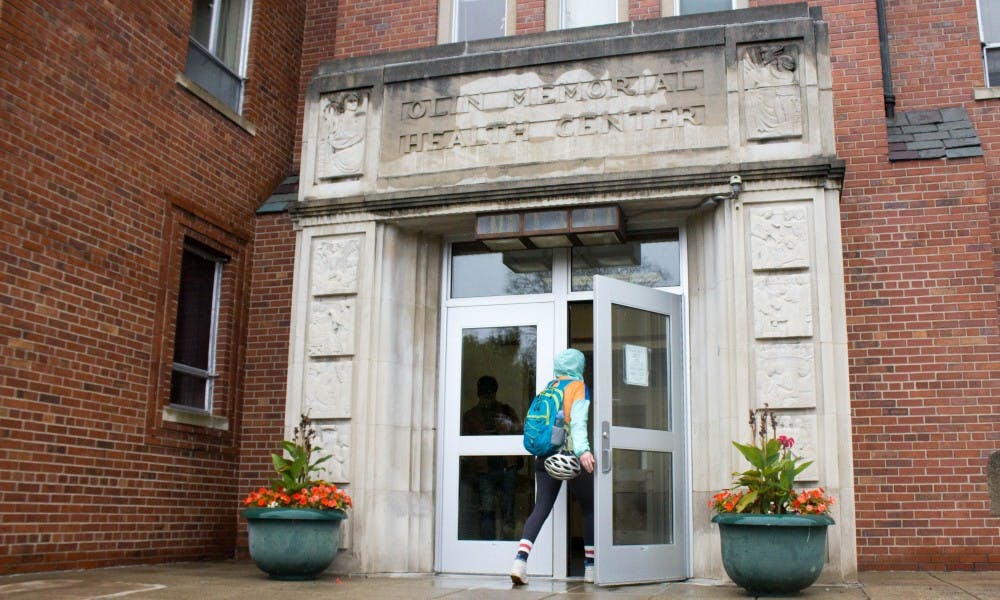Michigan State University Health Sciences will be one of three partners in a nearly $400 million effort to cure a rare genetic disease and increase access to rehabilitation care in Detroit put forth by the Gilbert Family Foundation, the foundation announced Wednesday.
The Gilbert Family Foundation was founded in 2015 by Dan and Jennifer Gilbert with two missions: cure neurofibromatosis and increase opportunity and equity for Detroit residents. The foundation is partnering with MSU Health Sciences and Henry Ford Health to launch two initiatives aimed at their dual-mission.
Neurofibromatosis, or NF, is a rare genetic disease that causes tumors to form on nerve tissue, including in the brain and on the spinal cord. The disease affects one in every 2,000 people.
The foundation has committed $50 million to build the Nick Gilbert Neurofibromatosis Research Institute as part of the new Henry Ford Health and MSU Research Building on Henry Ford’s campus. The institute is named after Dan and Jennifer’s late son, Nick Gilbert, who passed away from complications with NF in May.
The research institute will be solely focused on NF, which is often overlooked because of its rarity, Gilbert Family Foundation Executive Director Laura Grannemann said.
“There are many rare genetic diseases that often get overlooked by pharmaceutical companies and our overall research system because … there's just fewer patients who need those treatments,” Grannemann said. “This is going to give people the space to be able to fully focus on curing neurofibromatosis and it will come with obviously significant research funding opportunities, as well as a great economic development support for the city of Detroit.”
The foundation has committed an additional $190 million over ten years for operations and research, according to a press release Wednesday.
The research institute will utilize a technology called organoid research, which are like “little mini organs that are grown in a dish.” Researchers can take genetic material from patients and combine it with the organoids to test what treatment options for each individual patient, Granneman said.
“Let's say we take a brain tumor from a specific NF patient, we're able to take the genetic material from the healthy tissue and the unhealthy tissue in the brain, and then rapidly test treatment options on that brain tissue to see what is going to have the most impact for that specific patient,” Granemann said. “The really exciting thing here is that patients will then get personalized medical treatment as a result of this rapid research process.”
The Henry Ford Health and MSU Research Building, which will house the research facility, is part of a $2.5 billion project to redevelop and expand the Henry Ford campus, Executive Vice President for Health Sciences Norm Beauchamp said.
“It's going to allow us to expand our medical schools, nursing school, and it's also going to make the very best care in the world, because of its tie to research, available right there for the people in downtown Detroit,” Beauchamp said.
The Henry Ford expansion will also include a new hospital tower, which will feature the Shirley Ryan AbilityLab, a 72-bed neurological rehabilitation center, as part of the Henry Ford partnership with the Gilbert Family Foundation. The foundation will provide $119 million of the $179 million needed to construct the space.
The rehabilitation center is also an investment personal to the Gilbert family. Dan Gilbert attended the Shirley Ryan AbilityLab after he suffered a stroke five years ago and attributes the staff for the improvement in his quality of life, Grannemann said.
“We know that one in four adults over the age of 25 nationally are going to have a stroke at some point in their life,” Grannemann said. “And unfortunately, that number just goes up when you have underlying conditions and communities that are more prone to things like hypertension, or high blood pressure. So for Detroit residents, the stroke rehab center is going to be exceedingly important.”
In addition to the rehabilitation center, the foundation committed $10 million to a fund to help Detroiters access rehabilitation services. The fund will support families below 400% of the poverty line, Grannemann said.
“While Dan was in Chicago getting treatment for his stroke at the Shirley Ryan AbilityLab, he met many patients who unfortunately had to limit the number of rehab hours they had access to because they did not have enough insurance coverage,” Grannemann said. “This is especially the case for low income residents and families. And it was really important to us, and to him personally, that we created an opportunity to expand access for families who are low income and especially for Detroit residents.”
Beauchamp said the partnership will improve the community by advancing science, making high quality healthcare available locally, training the next generation of doctors and nurses, providing an economic uplift to the city of Detroit and addressing health disparities.
“For too many people, particularly in rural and urban Michigan, underrepresented medicine, people of color, they don't have access to health, they don't have access to hope,” Beauchamp said. “And really the defining goal of all of this work is to bring health and hope to people everywhere. And that's what I'm so proud of MSU for: that work.”







